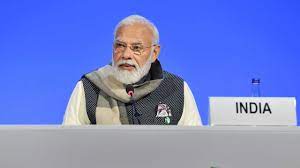Even as the world has grappled with the Covid-19 pandemic, the year, 2021, has served up a steady diet of climate disasters, from historic floods in China and Germany to devastating forest fires in Greece and Turkey and along the West Coast in the United States of America. So the timing of CoP26, the United Nations’ climate change conference that has drawn the world’s leaders to Glasgow since October 31, could not be more poignant. A week into the conclave, there has been definite progress. India has made an unprecedented commitment to transition to a net-zero emissions economy by 2070. Forty nations have pledged to phase out all coal usage for power generation by 2040. Global leaders have signed a deal to end deforestation by 2030. And if world leaders deliver on commitments made so far at CoP26, the International Energy Agency estimates that the rate at which the world is heating up might slow down: the planet will be 1.8 degrees Celsius warmer than pre-industrial levels by 2100, compared to a 2.1-degree prediction before the conference.
Yet the glass is only half full, at best, when it comes to climate action. India, China and the US, the world’s three biggest coal users, have steered clear of the commitment to stop using the energy source by 2040. Indonesia, home to the world’s third-largest area of tropical forests, has already warned that it might not be able to end deforestation by the end of this decade. And it is hard to be optimistic that most governments will actually deliver on their CoP26 promises. After all, only one nation is on track to fulfil its commitments under the 2015 Paris Agreement: Gambia in West Africa. Moreover, CoP26 is being held under the shadow of a worrying energy crisis that has only reinforced the stranglehold of fossil fuels over the global economy. Europe is begging Russia for extra gas while China and India are scrambling to secure additional coal to keep homes warm as winter approaches. But there is a silver lining. It is not just Gen Z youth, like the Swedish activist, Greta Thunberg, who are pressuring world leaders to act. From Germany and Canada to Norway and Iceland, climate change has in recent months emerged as a central focus of national elections, making it harder for politicians to avoid tough decisions. Glasgow offers a chance for the world to press reset. It must take it — for it will not get many more opportunities.











